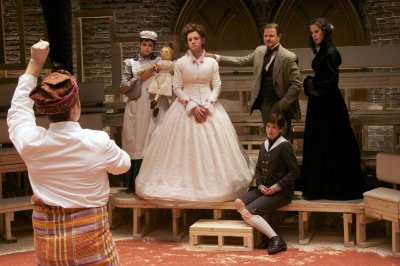Cloud Nine
Caryl Churchill’s remarkable time traveling play on sexual politics and repression belies the fact that it is 36 years old.

Sean Dugan (back to camera), Izzie Steele, Chris Perfetti, Clarke Thorell, Brooke Bloom (seated) and Lucy Owen in a scene from Caryl Churchill’s “Cloud Nine” (Photo credit: Doug Hamilton)
[avatar user=”Victor Gluck” size=”96″ align=”left” ] Victor Gluck, Editor-in-Chief[/avatar] What is most remarkable about Caryl Churchill’s time traveling comedy Cloud Nine is that this prescient play about sexual politics and repression is now 36 years old, though it could have been written this year. Still a challenging gender-bending play, it asks us how far we think we have come from the Victorians in our attitudes about sex and identity. Set among the British in Africa during the repressed 1879 in Act I and back in England in liberated London in 1979 in Act II, the characters switch roles, genders and ages in the course of the evening. It isn’t obvious until the second half where the play is headed or how brilliant Churchill has been. Cloud Nine (which proves not to be a nirvana for the characters) challenges a great many of our strictly held beliefs about the way the world is or should be.
Director James Macdonald who has staged four previous Churchill plays in New York (Love and Information, Drunk Enough to Say I Love You?, Top Girls and A Number) has created a fine, sharp production and obtained excellent and moving performances from his game cast of seven. However, he has made the play even more difficult by staging it in the round in which the audience sits in wood bleachers. This means that aside from attempting to keep the cast clear in their minds, the audience is in full view of each other at all times. More problematic still is that the new seats are neither deep enough to get comfortable, nor is there enough leg room to keep from squirming. Possibly, the point was to make the audience in their seats as uncomfortable as the characters who are expressing angst and distress on stage, or to make us all complicit in the events on stage. In either case, it is impossible to take your eyes off the stage for a moment as events unfold.
The first act introduces us to a British family living the good life in Victorian Africa – except no one is happy, and the natives are restless. Clive (played by Clark Thorell), a colonial administrator lives with his wife Betty (Chris Perfetti, a man), his son Edward (Brooke Bloom, a woman) who likes to play with dolls, his daughter Victoria (played by a doll), his dour mother-in-law Maud (Lucy Owen), his black servant Joshua (Sean Dugan, who is white) and his children’s governess Ellen (Izzie Steele, a woman). They receive a visit from a widowed neighbor, Mrs. Saunders (Steele again), who doesn’t want to be alone on her estate during the predicted native uprising. At the same time family friend, Henry Bagley (John Sanders), the explorer, drops in to take time off from his adventuring.
This sets off a daisy chain of sexual liaisons. Clive lusts after Mrs. Saunders, while his wife is in love with Henry. Unfortunately for her, Henry plays for the other team and is having it off with Joshua and young Edward, while Ellen pines for Betty. With the mores of the previous generation, Maud looks on all of this disapprovingly as she does everything. This first act and generation is male dominated with the women subservient to them, just as the natives are. The fact that Joshua is played by a white actor is explained by his identifying so much with his masters that he has rejected his own culture. While the audience watchs the same-sex liaisons, they are actually watching a man romancing a woman in the guise of a boy (Henry and Edward) and a woman romancing a man (Ellen and Betty). Churchill appears to be saying that gender roles are social constructs. Who decreed that women couldn’t travel alone or be the sexual aggressors or decided that boys shouldn’t play with dolls?
The second act takes place mainly in a London park in 1979 after the sexual revolution, 100 years later. However for the characters, only 25 years have gone by. Churchill is saying we haven’t come as far as we think we have and are simply the children of the Victorians. Clive and Betty (Brooke Bloom) are separating, and their children Victoria (played by Lucy Owen) and Edward (Chris Perfetti) are all adults with partners of their own. Edward who is now openly gay has a roommate Gerry (Sean Dugan), a promiscuous man, rough trade, who is drifting away. Victoria is married to the pseudo-feminist Martin (John Sanders) who is making use of the sexual revolution to have many adulterous affairs but claims he wants his wife to be happy.

Lucy Owen and Chris Perfetti in a scene from Caryl Churchill’s “Cloud Nine” (Photo credit: Doug Hamilton)
Their son Tommy (unseen) is in nursey school with Lin (Izzie Steele)’s daughter Cathy (played by Clarke Thorell). Lin, a lesbian, has developed a passion for Victoria, while the middle-aged Betty now living alone has discovered the pleasure of masturbation for the first time. Lin’s brother Bill (Thorell again) is in Northern Ireland with the British occupying forces, much like Clive was in Africa in the first act. In this half of the play the women and the gay characters appear to be in control, although most of them are still finding their way. How all this plays out to reach a happy ending for one and all is the plot of the second act. Nothing is what it seems and no one knows what they may actually most like.
From the convoluted plot, with all of the actors playing at least two roles and several three, it is a challenge for both performers and audience to keep track of who was who. However, while the summary may sound complicated, in performance with this excellent cast, it is not difficult to follow. Macdonald has obtained incisive English characterizations as well as credible English accents, though only one member of the cast (Izzie Steele) is actually British. The double allows the cast to demonstrate their versatility.
Although the doubling has varied in different productions, this version goes back to the first Joint Stock Theatre Group which gave the play its world premiere. Chris Perfetti is a passive, inhibited but nervous Betty in Victorian times, and an equally timid and nervous Edward in modern times. His Edward does finally learn to relax and not be so highstrung as he comes to terms with his sexuality. Lucy Owen begins the play as middle-aged Maud, stuck in the fixed beliefs of her era, and then turns into the modern Victoria who is dissatisfied with her life but not certain which of her choices to take up.
Ms. Brooke Bloom begins as the curious, nervous Edward in Act I, and reappears in Act II as the middle-aged Betty, now just as curious about sex as the younger Betty was timid about it in Victorian times. John Sanders gets much mileage out of two hypocritical characterizations, the randy Harry Bagley, restrained to secrecy by the rules of his society in the nineteenth century, and Martin, Victoria’s husband, who in the liberated 1970 lives out his sexual fantasies without hiding, but considering himself a feminist. Sean Dugan remarkably conveys his feelings as the almost silent servant Joshua observing the British at play, and then returns as the equally voluble but laid back Gerry, Edward’s lover and sometime roommate, in modern times.
Playing three roles, Ms. Izzy Steele appears as the governess Ellen living a double life as a closeted lesbian and as Mrs. Saunders who finds no need for a man, living as an independent woman in Victorian times, and then as Lin, living openly as a lesbian and a single mother in modern times. Clarke Thorell also appears in three roles: as Clive, glorying in his unequaled power in the male-dominated society of Victorian Britain, then as Lin’s nursey school age child Cathy in the 20th century as well as Lin’s brother Bill, a disgruntled British soldier stationed in Belfast.
Aside from the problems created by the bleachers as makeshift seats, the production team has done their work expertly. Dane Laffrey’s design for Act I has the stage covered in the red earth of Africa while the scaffolding of the bleachers allows for seats for the characters as well as multiple exits and entrances. For the second act, he turns the stage into a large green English park. Gabriel Berry has created a black and white wardrobe for the staid Victorian times, and a colorful 1979 collection of casual wear for the second act. In Scott Zielinski’s lighting design, the bright African sun of the first half, gives way eventually to the nighttime scene in which several of the characters attempt to conjure ghosts. Most memorable are the hair and wig designs by Cookie Jordan which so completely change the actors’ genders. Ben Furey has been the consultant on the required English dialects for the different strata of society.
It is rather remarkable that Caryl Churchill’s Cloud Nine has not been seen in New York since Tommy Tune’s production closed at the Lucille Lortel Theatre in 1983 after 971 performances. In an era when the rights of transgendered individuals are openly discussed, this remarkable play being given an excellent revival will rightfully continue the conversation about gender and sexuality.
Cloud Nine (through November 1, 2015)
Atlantic Theater Company
Linda Gross Theater, 336 W. 20th Street, in Manhattan
For tickets call, call 866-811-4111 or visit http://www.atlantictheater.org
Running time: two hours and 40 minutes with one intermission






Leave a comment